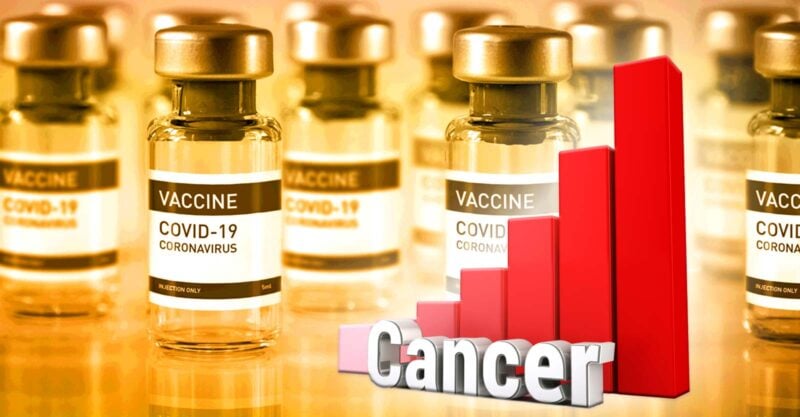
Covid-19 vaccines and boosters – both mRNA and non-mRNA – pose an increased risk of six types of cancer and a 27 per cent higher risk of cancer overall, according to a recent South Korean study of over 8 million people.
Four South Korean researchers published the report last week as a letter in Biomarker Research, a Springer Nature journal.
According to the study, Covid-19 vaccines and boosters are associated with a higher risk of breast, colorectal, gastric, lung, prostate and thyroid cancer, across all vaccine types and age groups.
Mainstream medical commentators were quick to dismiss the findings, with MedPageToday describing it as “flawed.” But other medical and scientific experts disagreed.
“In plain terms: both major Covid-19 vaccine platforms appear to be carcinogenic,” epidemiologist Nicolas Hulscher wrote in a post on Substack.
Dr Angus Dalgleish, a medical oncologist, told The Defender the study builds on other recent findings but “is the first to show that cDNA [non-mRNA] and mRNA vaccines are associated with cancer risk, suggesting that the spike protein is directly carcinogenic.”
Medical commentator John Campbell, said this week on his YouTube show that the research marks “the largest-scale study so far” examining the association between the Covid-19 shots and cancer.
According to the study, while the carcinogenic potential of the SARS-CoV-2 virus responsible for Covid-19 “has been hypothetically proposed,” there has been little research on the potential cancer risk from Covid-19 vaccines.
The researchers said the “shared structures” contained within the SARS-CoV-2 virus and the Covid-19 vaccines, including the spike protein, might mean that the Covid-19 shots are associated with cancer risks.
The study used data from 2021-2023 for over 8.4 million people in South Korea’s National Health Insurance Service database. The sample was split into two groups based on vaccination status. The vaccinated sample was further split into booster and non-booster groups.
Researchers tracked the patients for one year. The vaccinated group was tracked following vaccination. The results showed a statistically significant higher risk of cancer in the vaccinated group, including:
Overall cancer: 27 per cent higher risk
Breast cancer: 20 per cent higher risk
Colorectal cancer: 28 per cent higher risk
Gastric cancer: 34 per cent higher risk
Lung cancer: 53 per cent higher risk
Prostate cancer: 69 per cent higher risk
Thyroid cancer: 35 per cent higher risk
The statistical analysis of the results showed that there is a “1 in 1,000 chance that this result arose by chance,” Campbell said.
Covid-19 mRNA vaccines produced by Pfizer and Moderna showed a 20 per cent higher overall risk of cancer and were most closely linked to a higher risk of breast, colorectal, lung and thyroid cancers.
Non-mRNA Covid-19 vaccines, known as cDNA vaccines and which include the AstraZeneca and Johnson & Johnson (Janssen) shots, were associated with a 47 per cent higher overall risk of cancer. They were specifically linked to an increased risk of colorectal, gastric, lung, prostate and thyroid cancers.
Patients who received a mixture of mRNA and cDNA doses also faced an increased risk, with a 34 per cent higher incidence of cancer overall and a close association with a higher risk of breast and thyroid cancers.
“The elevated cancer risks were not confined to one vaccine platform,” Hulscher wrote. “Each vaccine type was associated with a measurable increase in overall cancer – and each had specific cancer sites driving the signal. In other words, no vaccine technology was free of cancer risk in this dataset.”
Internal medicine physician Dr Clayton J. Baker said the data show that among vaccinated people, the cancer risk increases with time.
“The increased risk of cancer for vaccinated subjects rises in a linear fashion over the entire period of the study, at a steeper angle than the unvaccinated curve, and it does not flatten out. The increased incidence just keeps getting bigger. It could go on for decades. It’s truly alarming,” Baker said.
The results also showed vaccinated people under 65 years of age were at particular risk of some types of cancer.
“The relatively younger population (individuals under 65 years) was more vulnerable to thyroid and breast cancers; by comparison, the older population (75 years and older) was more susceptible to prostate cancer,” the researchers wrote.
Overall, vaccinated people under age 65 showed an overall increased risk of cancer, while elderly adults – particularly those over 75 – had the highest overall risk.
Vaccinated women also had a relatively higher risk of cancer than vaccinated men, with vaccinated women showing a particularly increased risk of colorectal and thyroid cancers and vaccinated men showing a higher risk of gastric and lung cancers.
Hulscher wrote: “Both the overall and site-specific results show a consistent pattern – every demographic group experienced elevated cancer risks, though the type and absolute burden varied. Women and the elderly were hit hardest, but no population segment was spared.”
The study’s results also showed that Covid-19 boosters resulted in a substantially higher risk of certain types of cancer. This included a 125 per cent higher risk of pancreatic cancer and a 23 per cent higher risk of gastric cancer.
Dalgleish called the numbers “striking,” saying the jump in risk after booster shots “is an unexpected increase that we are also seeing in the United Kingdom.”
According to MedPageToday, the one-year follow-up period the researchers used in the study was “bonkers,” and the study didn’t take into account the patients’ family histories of cancer and their screening history.
Karl Jablonowski, senior research scientist at Children’s Health Defence, said “the criticism levelled against the study is of healthy user bias.”
He explained: “The idea that people more likely to engage in one medical intervention (vaccination) are also more likely to engage in another (cancer screening) … is a valid concern for a vaxed-unvaxed study such as this one, as those seeking a vaccine will have drastically different healthcare-seeking behaviour than those not seeking a vaccine.
“[However,] this is not just a vaxed-unvaxed study – it also differentiates the vaccines. Healthy user bias is not a point of argument for why one vaccine (cDNA) shows a strong cancer risk above another (mRNA). Further, the study doesn’t say vaccines cause cancer, but are associated with them.
“We are complex multicellular organisms. Cancerous cells are created within us with great frequency, and are usually subdued by our anti-cancer mechanisms. … If a vaccine can disrupt that anti-cancer mechanism, then cancers can manifest in a short time window.”
Even if cDNA vaccines were shown to pose a higher cancer risk, Baker said the study also highlights the risk of mRNA technology.
“This study absolutely implicates the mRNA platform,” he said. “Remember, Covid-19 was the first widespread use of that technology platform in humans … In its first application, it increases cancers.”
Campbell said official South Korean data is typically reliable, and the study was well structured.
“South Korea was a very heavily vaccinated country,” he said. “There was … just a few hundred thousand in the unvaccinated group, but that’s good enough to get some pretty good data from.”
The study’s authors did not elaborate on possible mechanisms contained within the Covid-19 vaccines that might result in a higher cancer risk. Baker said the “significantly increased hazard ratios for six different cancer types suggests to me a possible immune system impairment contributing to the increased risk. It’s frightening, because the risk is not limited to any one type of cancer that might be screened against.”
According to Campbell, the spike protein and DNA contaminants found in the mRNA vaccines may be among the factors contributing to this risk.
The authors suggested that more research is necessary “to elucidate potential causal relationships, including the underlying molecular mechanisms related to Covid-19 vaccine-induced hyperinflammation.”
Other recent large-scale studies and analyses suggest a link between the Covid-19 vaccines and serious adverse events such as cancer.
Earlier this year, an analysis of a Japanese database of 18 million people showed that people who received Covid-19 vaccines had a significantly higher risk of death in the first year after vaccination compared to the unvaccinated. The risk increased with each additional dose.
A study of 1.3 million women in the Czech Republic published in the International Journal of Risk & Safety in Medicine in June showed that the rate of successful conception – a pregnancy leading to live birth nine months later — for vaccinated women was “substantially lower” than for those who were unvaccinated.
A 30-month study of nearly 300,000 people in Italy, published in the journal EXCLI in July, found a 23 per cent increased risk of cancer following one or two doses of the Covid-19 vaccine, and an additional 9 per cent increased risk among those who received three or more doses.
The Italian study’s results also showed statistically significant increases in breast, bladder and colorectal cancers. Jablonowski said the Italian study’s findings largely mirror those of the South Korean study, as there is “a corroboration of evidence that cannot be ignored.”
“The comparison of the results … is awfully interesting,” Jablonowski said. “The two studies generally agree on many cancer types. One form of cancer that they do not agree on is prostate cancer. It is not remotely noteworthy in the Italian study, and the strongest signal in the Korean study.”
The South Korean researchers said the balance between the relative risks of Covid-19 infection and adverse events following Covid-19 vaccination warrants further examination.
“Given the decreasing severity of Covid-19, current concerns regarding the Covid-19 vaccine primarily revolve around AEs [adverse events] even with booster shots,” the researchers wrote.
The authors of the study also called for more research “to determine whether specific vaccination strategies may be optimal for populations in need of Covid-19 vaccination.” They suggested that clinicians “prioritise monitoring the risk of gastric cancer in relation to Covid-19 booster doses.”
Hulscher went further, suggesting the study’s results strengthen calls by some scientists and medical organizations that the Covid-19 vaccines should be suspended or withdrawn.
“Governments, regulators, clinicians and researchers must confront a sobering reality: nearly 70 per cent of the global population has been injected with a carcinogenic product. The evidence demands immediate market withdrawal of these products,” Hulscher wrote.
“It is now completely indefensible to continue any booster or variant vaccine programme,” Dalgleish said.
- A Tell Media report / By Prof Michael Nevradakis – Senior reporter for The Defender





